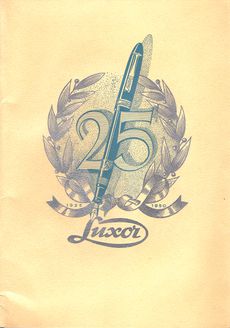Luxor
| Luxor |
|---|
| Brand pages |
| Brand advertising |
| Brand photos |
| Other documents |
| Patents |

La Luxor venne fondata nel 1925 a Heidelberg da Heinrich Hebborn. La giovane età gli evitò la partecipazione diretta alla prima guerra mondiale, ed iniziò a lavorare molto presto in una cartiera finché intorno al 1921 conobbe ad Heidelberg Rudolph Weber, socio di riferimento della Kaweco, con la quale iniziò a collaborare diventando responsabile della filiale di Colonia. Nel 1925 si associò ad un commerciante di origini ebraiche, Leo Boettigheimer, che morirà poi nel campo di Auschwitz nel 1943, ed ad un venditore Kaweco, Heinrich Schlicksupp. I tre insieme dettero vita allla Hebborn & Co.
Benché il nome ufficiale dell'azienda sia H. Hebborn & Co. essa è universalmente nota con il nome del suo marchio principale, Luxor; oltre a questo, mantenendo una ispirazione ai temi dell'antico Egitto, venne usato come marchio secondario anche Sphinx. Nel 1938 la ditta spostò gli impianti produttivi a Colonia.
In the '40s, the company invented a telescopic piston filler with two concentric sections which allowed to have a much shorter mechanism, resulting in more space for the ink reservoir. The mechanism was mounted on a model called Teleskop, and it seems that it is the same one that was later adopted also by Montblanc for its flagship models of the series 130 and 140.
Altri nomi noti di modelli prodotti dall'azienda sono i seguenti: Visible, Grandvisible ...
The activities of the Luxor ended around the 70s with the acquisition by the Parker German branch, and today the brand is no more.